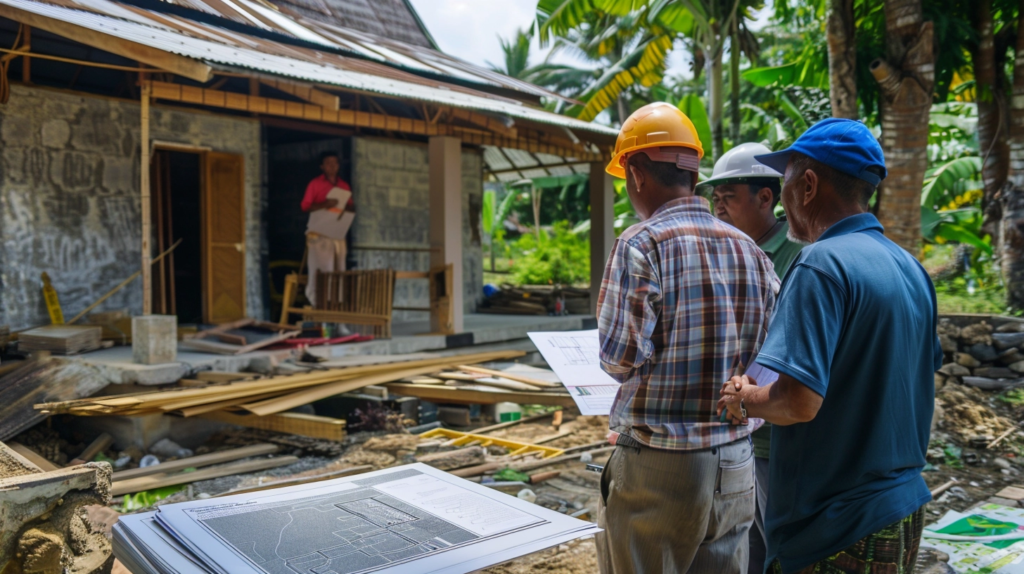Last Updated on September 12, 2024 by Nour Estates
Lombok, Indonesia, is an increasingly attractive destination for real estate investment, offering stunning natural beauty, affordable prices, and growing infrastructure. However, buying property in Lombok comes with its own set of challenges. Understanding and avoiding common pitfalls can help ensure a successful investment and prevent costly mistakes. This guide highlights some of the most common pitfalls in buying property in Lombok and offers tips on avoiding them.
Table of Contents
1. Unclear Property Titles and Ownership Issues

One of the most significant risks when buying property in Lombok is dealing with unclear or disputed property titles. Indonesia’s land ownership laws can be complex, and property titles are not always properly documented, especially in rural areas.
A. Multiple Claims on Property
Overview:
In some cases, a property may have multiple claims of ownership, often due to inheritance issues or unclear documentation. This can lead to legal disputes and challenges in establishing clear ownership.
Tip:
Conduct a thorough title search with the help of a local lawyer or notary to verify that the property has a clear and undisputed title.
Example:
A foreign buyer discovers after purchasing a property that distant relatives of the previous owner also claim it, leading to a lengthy legal battle.
B. Unregistered Land
Overview:
Not all land in Lombok is registered with the government, particularly in rural areas. Buying unregistered land can lead to legal complications and difficulty in proving ownership.
Tip:
Ensure that the property is registered with the Indonesian land office (BPN) and that the title deed is legitimate and current.
Example:
A foreign buyer purchases a plot of land only to find out later that it is not officially registered, making it difficult to sell or transfer the property.
2. Foreign Ownership Restrictions
Indonesia has strict laws regarding foreign ownership of property, which can create challenges for international buyers. Foreigners cannot own freehold land directly, and alternative ownership structures must be carefully considered.

A. Misunderstanding Legal Structures
Overview:
Foreign buyers often misunderstand or overlook the legal restrictions on property ownership in Indonesia. Some may mistakenly believe they can own freehold land, leading to legal complications.
Tip:
Familiarize yourself with the legal options available to foreigners, such as leasehold titles (Hak Sewa), right to use (Hak Pakai), or setting up a foreign-owned company (PT PMA).
Example:
A foreign buyers unknowingly purchases freehold land, only to discover later that the transaction is illegal and the property is at risk of being reclaimed.
B. Risky Nominee Arrangements
Overview:
Some foreign investors use nominee arrangements, where an Indonesian citizen holds the property title on their behalf. However, these arrangements are legally risky and not officially recognized.
Tip:
Avoid nominee arrangements and instead explore legally recognized structures, such as setting up a PT PMA or using a leasehold agreement.
Example:
A foreign buyer uses a local nominee to purchase land, but when a dispute arises, the nominee claims full foreign ownership of the property, leaving the buyer with no legal recourse.
3. Lack of Due Diligence

Failing to conduct proper due diligence is a common pitfall that can lead to costly mistakes. Due diligence involves thoroughly investigating the property, legal status, and potential risks before making a purchase.
A. Skipping Property Inspections
Overview:
Some buyers rush into a purchase without thoroughly inspecting the property. This can lead to unexpected issues, such as structural problems, zoning violations, or boundary disputes.
Tip:
Hire a professional inspector to assess the property’s condition, boundaries, and compliance with local zoning laws.
Example:
A buyer purchases a villa without inspecting it, only to find out later that it has significant structural issues that require costly repairs.
B. Ignoring Zoning and Land Use Regulations
Overview:
Zoning and land use regulations in Lombok can be complex and vary by region. Ignoring these regulations can result in legal problems and restrictions on property use.
Tip:
Verify the property’s zoning and land use classification with local authorities to ensure that your intended use is permitted.
Example:
A buyer purchases land intending to build a commercial property, only to discover that the land is zoned for residential use, preventing them from proceeding with their plans.
4. Underestimating Costs and Fees
Many buyers focus solely on the purchase price and overlook the additional costs and fees associated with buying property in Lombok. These expenses can add up quickly and affect the overall affordability of the investment.
A. Unexpected Taxes and Fees
Overview:
In addition to the purchase price, buyers must pay various taxes and fees, including transfer taxes, notary fees, and ongoing property taxes. Failing to account for these costs can strain your budget.
Tip:
Budget for all taxes and fees, including transfer tax (BPHTB), value-added tax (VAT) on new properties, notary fees, and annual land and building tax (PBB).
Example:
A buyer is surprised by the high transfer tax and notary fees, which push their total costs beyond their initial budget.
B. Maintenance and Management Costs
Overview:
Owning property in Lombok involves ongoing maintenance and management costs, especially if you plan to rent out the property. Neglecting these costs can reduce your overall return on investment.
Tip:
Factor in the costs of property management, maintenance, insurance, and utilities when calculating the total cost of foreign ownership.
Example:
A buyer purchases a vacation home but underestimates the cost of maintaining the property and managing short-term rentals, resulting in lower-than-expected returns.
5. Overpaying for Property
Overpaying for property is a common pitfall, particularly for foreign buyers who may be unfamiliar with local market conditions. Overpaying can reduce your potential returns and make it harder to resell the property in the future.
A. Lack of Market Research
Overview:
Without proper market research, buyers may overestimate property values and pay more than the market rate. This is especially common in popular tourist areas where demand is high.
Tip:
Research comparable sales in the area, consult with local real estate agents, and negotiate based on market data to ensure you’re paying a fair price.
Example:
A buyer overpays for a beachfront villa in Senggigi, only to find that similar properties in the area are selling for significantly less.
B. Falling for High-Pressure Sales Tactics
Overview:
Some sellers or agents may use high-pressure sales tactics to rush buyers into a decision. This can lead to overpaying or making a purchase without fully considering all factors.
Tip:
Take your time, conduct thorough research, and avoid making impulsive decisions. Don’t be afraid to walk away if the deal doesn’t feel right.
Example:
A buyer is pressured into purchasing a property quickly due to claims of other interested buyers, only to realize later that the price was inflated.
6. Legal and Bureaucratic Delays
Navigating Indonesia’s legal and bureaucratic processes can be challenging, particularly for foreign buyers unfamiliar with the system. Delays in obtaining permits, property titles, and approvals can slow down the transaction process and create frustration.

A. Delays in Title Transfer and Registration
Overview:
The process of transferring and registering property titles in Indonesia can be slow, leading to delays in finalizing the transaction. This can be especially problematic if you’re working within a tight timeline.
Tip:
Work with a reputable notary and lawyer who can help expedite the process and ensure that all necessary documents are in order.
Example:
A buyer faces months of delays in transferring the title due to bureaucratic inefficiencies, delaying their plans for property development.
B. Challenges with Building Permits
Overview:
Obtaining the necessary building permits can be time-consuming if you’re planning to build or renovate a property. Failing to secure permits before starting construction can result in fines or legal issues.
Tip:
Ensure that all permits are in place before beginning any construction or renovation work. Consider hiring a local contractor familiar with the permitting process.
Example:
A buyer begins renovating a property without the proper permits, leading to a stop-work order and legal complications.
7. Cultural and Communication Barriers
Cultural and communication barriers can complicate the property-buying process in Lombok, particularly for foreign buyers. Misunderstandings or lack of clear communication can lead to mistakes and delays.
A. Language Barriers
Overview:
While English is widely spoken in tourist areas, many legal and bureaucratic processes in Indonesia are conducted in Bahasa Indonesia. Language barriers can lead to misunderstandings during negotiations and legal proceedings.
Tip:
Hire a translator or work with a bilingual real estate agent and lawyer to ensure clear communication throughout the process.
Example:
A buyer misses important details in the sale agreement due to language barriers, leading to confusion and additional costs later on.
B. Cultural Differences in Business Practices
Overview:
Cultural differences in business practices and negotiation styles can affect the property-buying process. Understanding and respecting these differences is crucial for successful transactions.
Tip:
Take the time to learn about local customs and business practices. Be patient and flexible in negotiations, and seek advice from local experts.
Example:
A buyer misinterprets a seller’s negotiation style and becomes frustrated, potentially jeopardizing the deal.
8. Overlooking the Importance of Legal Representation
Some buyers attempt to navigate the property purchase process in Lombok without legal representation, which can lead to costly mistakes. Having a local lawyer who understands Indonesian property law is essential for protecting your interests.
A. Skipping Legal Reviews
Overview:
Failing to have legal documents, such as sale agreements and title deeds, reviewed by a lawyer can result in unfavorable terms or legal issues down the line.
Tip:
Always have a qualified local lawyer review all legal documents before signing any agreements. This ensures that the contract is fair, legally binding, and in compliance with Indonesian law.
Example:
A buyer signs a sale agreement without legal review, only to discover unfavorable terms that limit their rights as a property owner.
B. Overlooking Due Diligence
Overview:
A lawyer can also help with due diligence, such as verifying property titles, checking for outstanding taxes or liens, and ensuring that the property complies with local regulations.
Tip:
Engage a lawyer early in the process to conduct thorough due diligence and avoid potential legal complications.
Example:
A lawyer discovers an unresolved legal dispute over the property title, allowing the foreign buyers to back out of the deal before it becomes a problem.
Conclusion
Buying property in Lombok offers exciting opportunities, but it also comes with potential risks and challenges. By being aware of common pitfalls and taking proactive steps to avoid them, you can ensure a smooth and successful property purchase. Whether you’re a first-time buyer or an experienced investor, working with local experts, conducting thorough due diligence, and understanding the legal landscape will help you navigate the Lombok real estate market with confidence.
About Nour Estates
We started Nour Estates with a simple idea: to make finding your dream property in Indonesia as easy and enjoyable as a day at the beach. Our team is a mix of local folks and people from around the world who fell in love with Indonesia just like you. We’ve been in your shoes, faced the challenges of buying land here, and learned all the ins and outs. Now, we’re here to share that knowledge with you.
We are here to find you the perfect property to invest in. Contact us today, and let’s start this exciting journey together!




































